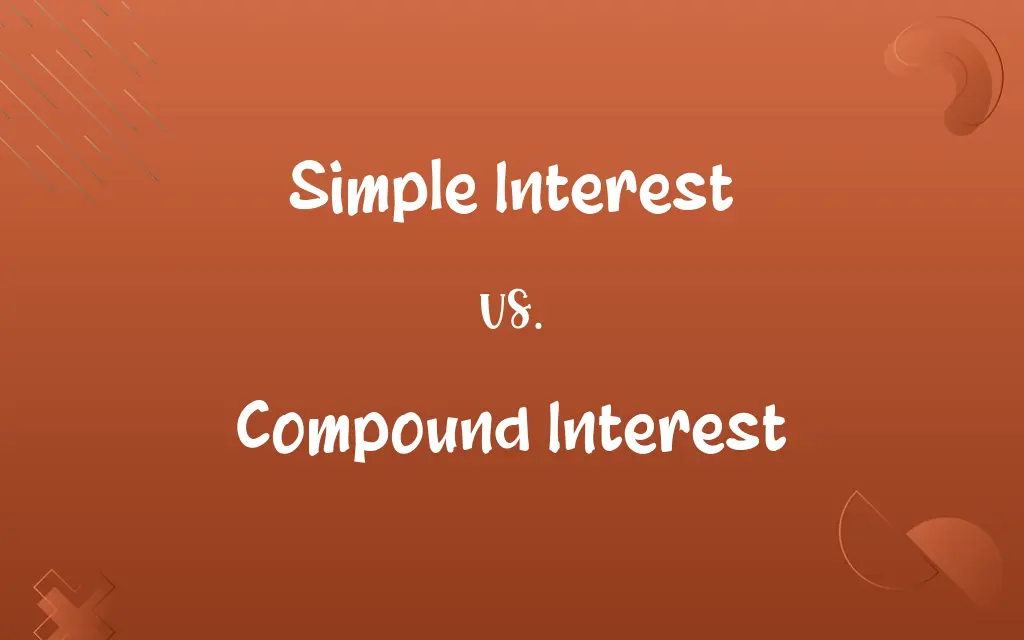Simple Interest vs. Compound Interest: Know the Difference

By Shumaila Saeed || Published on January 17, 2024
Simple Interest is calculated on the principal amount of a loan or investment, remaining constant over time, while Compound Interest is calculated on the principal amount and the interest that accumulates on it over periods, leading to exponential growth.

Key Differences
Simple Interest is calculated on the initial principal only, leading to a linear growth of interest over time. In contrast, Compound Interest is calculated on the initial principal and the accumulated interest, resulting in interest on interest.
Shumaila Saeed
Jan 17, 2024
In Simple Interest, the interest amount remains constant throughout the investment period. Compound Interest, however, sees the interest amount increase over time as it is calculated on the growing principal.
Shumaila Saeed
Jan 17, 2024
Simple Interest is straightforward to calculate and understand, making it suitable for short-term loans or investments. Compound Interest is more complex but beneficial for long-term investments due to its exponential growth potential.
Shumaila Saeed
Jan 17, 2024
The total amount repaid or earned over time is generally less with Simple Interest compared to Compound Interest for the same principal and rate over the same period.
Shumaila Saeed
Jan 17, 2024
Simple Interest is commonly used in auto loans, short-term personal loans, and some types of mortgages. Compound Interest is prevalent in savings accounts, credit card balances, and long-term investments like retirement funds.
Shumaila Saeed
Jan 17, 2024
ADVERTISEMENT
Comparison Chart
Interest Growth
Linear, remains constant over time
Exponential, increases over time
Shumaila Saeed
Jan 17, 2024
Complexity
Simple and easy to calculate
More complex due to compounding factors
Shumaila Saeed
Jan 17, 2024
Suitability
Short-term loans and investments
Long-term savings and investments
Shumaila Saeed
Jan 17, 2024
Total Return
Generally lower than compound interest
Potentially higher due to interest on interest
Shumaila Saeed
Jan 17, 2024
ADVERTISEMENT
Simple Interest and Compound Interest Definitions
Simple Interest
Simple Interest is straightforward and constant over the investment term.
The simple interest on the bond provided a predictable return.
Shumaila Saeed
Jan 07, 2024
Compound Interest
Compound Interest is beneficial for long-term investments.
Thanks to compound interest, their college fund doubled in 18 years.
Shumaila Saeed
Jan 07, 2024
Simple Interest
Simple Interest is not compounded, thus not adding to the principal.
The simple interest on his savings remained the same each year.
Shumaila Saeed
Jan 07, 2024
Compound Interest
Compound Interest uses the formula: A = P(1 + r/n)^(nt).
With an annual compound interest rate, her investment grew more than with simple interest.
Shumaila Saeed
Jan 07, 2024
Simple Interest
Simple Interest is interest calculated only on the principal amount.
Her loan of $5,000 at 5% simple interest resulted in a total interest of $250 after one year.
Shumaila Saeed
Jan 07, 2024
ADVERTISEMENT
Compound Interest
Compound Interest results in exponential growth of an investment over time.
The compound interest on her retirement fund significantly increased the total value over 30 years.
Shumaila Saeed
Jan 07, 2024
Simple Interest
Simple Interest is preferred for short-term loans due to its fixed nature.
They chose a simple interest rate for their 12-month car loan.
Shumaila Saeed
Jan 07, 2024
Compound Interest
Compound Interest is calculated periodically, adding to the principal.
The quarterly compound interest increased his investment more rapidly than simple interest.
Shumaila Saeed
Jan 07, 2024
Simple Interest
Simple Interest is calculated using the formula: Interest = Principal x Rate x Time.
For a $1,000 deposit at 3% simple interest annually, she earned $30 after one year.
Shumaila Saeed
Jan 07, 2024
Compound Interest
Compound Interest is calculated on the principal amount plus the accumulated interest.
His savings account grew faster due to the compound interest.
Shumaila Saeed
Jan 07, 2024
Repeatedly Asked Queries
What is Compound Interest?
Compound Interest is interest calculated on the initial principal and also on the accumulated interest of previous periods.
Shumaila Saeed
Jan 17, 2024
What is Simple Interest?
Simple Interest is interest calculated on the principal amount of a loan or deposit.
Shumaila Saeed
Jan 17, 2024
When is Compound Interest used?
Compound Interest is often used in savings accounts, credit card balances, and long-term investments.
Shumaila Saeed
Jan 17, 2024
When is Simple Interest used?
Simple Interest is commonly used for short-term loans or investments.
Shumaila Saeed
Jan 17, 2024
What is the key difference between Simple and Compound Interest?
The key difference is that Simple Interest is calculated only on the principal amount, whereas Compound Interest is calculated on the principal and the accumulated interest.
Shumaila Saeed
Jan 17, 2024
Does Simple Interest grow a principal amount faster than Compound Interest?
No, Compound Interest typically grows a principal amount faster than Simple Interest over time.
Shumaila Saeed
Jan 17, 2024
Can Simple Interest change over the period of a loan or investment?
Typically, Simple Interest remains the same throughout the loan or investment period.
Shumaila Saeed
Jan 17, 2024
Does Compound Interest affect the amount owed on a debt more significantly over time?
Yes, Compound Interest can significantly increase the amount owed on a debt over time due to interest being calculated on accumulated interest.
Shumaila Saeed
Jan 17, 2024
How is Compound Interest calculated?
A = P(1 + r/n)^(nt), where A is the amount, P is the principal, r is the rate, n is the number of times interest is compounded per year, and t is time in years.
Shumaila Saeed
Jan 17, 2024
Is Simple Interest beneficial for short-term or long-term investments?
Simple Interest is more beneficial for short-term investments.
Shumaila Saeed
Jan 17, 2024
Does the frequency of compounding affect the amount of Compound Interest earned?
Yes, the more frequently interest is compounded, the more interest will be earned.
Shumaila Saeed
Jan 17, 2024
Is it easier to calculate Simple Interest or Compound Interest?
Simple Interest is easier to calculate as it involves a straightforward formula.
Shumaila Saeed
Jan 17, 2024
Can the rate of interest differ between Simple and Compound Interest?
Yes, the rate of interest can differ and is set by the lender or financial institution.
Shumaila Saeed
Jan 17, 2024
In what financial situations is Simple Interest more commonly applied?
Simple Interest is more commonly applied in personal loans, car loans, and short-term loans.
Shumaila Saeed
Jan 17, 2024
How does Compound Interest benefit long-term investors?
Compound Interest benefits long-term investors by significantly increasing the value of their investments over time.
Shumaila Saeed
Jan 17, 2024
Can the principal amount decrease in either Simple or Compound Interest?
The principal amount doesn’t decrease in either case unless partial repayments are made.
Shumaila Saeed
Jan 17, 2024
Why is Compound Interest preferred for savings and retirement accounts?
Compound Interest is preferred for savings and retirement accounts because it accelerates the growth of the investment over time.
Shumaila Saeed
Jan 17, 2024
How frequently can interest be compounded?
Interest can be compounded annually, semi-annually, quarterly, monthly, or even daily.
Shumaila Saeed
Jan 17, 2024
Is Compound Interest always better than Simple Interest?
Compound Interest is generally better for long-term growth, but the best choice depends on the specific financial situation and goals.
Shumaila Saeed
Jan 17, 2024
Share this page
Link for your blog / website
HTML
Link to share via messenger
About Author
Written by
Shumaila SaeedShumaila Saeed, an expert content creator with 6 years of experience, specializes in distilling complex topics into easily digestible comparisons, shining a light on the nuances that both inform and educate readers with clarity and accuracy.









































































